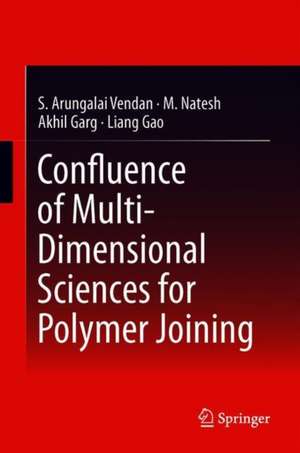Confluence of Multidisciplinary Sciences for Polymer Joining
Autor S. Arungalai Vendan, M. Natesh, Akhil Garg, Liang Gaoen Limba Engleză Hardback – 31 ian 2019
Preț: 780.68 lei
Preț vechi: 952.05 lei
-18% Nou
Puncte Express: 1171
Preț estimativ în valută:
149.43€ • 162.37$ • 125.60£
149.43€ • 162.37$ • 125.60£
Carte tipărită la comandă
Livrare economică 21 aprilie-05 mai
Preluare comenzi: 021 569.72.76
Specificații
ISBN-13: 9789811306259
ISBN-10: 9811306257
Pagini: 147
Ilustrații: XII, 147 p. 104 illus., 50 illus. in color.
Dimensiuni: 155 x 235 x 12 mm
Greutate: 0.4 kg
Ediția:1st ed. 2019
Editura: Springer Nature Singapore
Colecția Springer
Locul publicării:Singapore, Singapore
ISBN-10: 9811306257
Pagini: 147
Ilustrații: XII, 147 p. 104 illus., 50 illus. in color.
Dimensiuni: 155 x 235 x 12 mm
Greutate: 0.4 kg
Ediția:1st ed. 2019
Editura: Springer Nature Singapore
Colecția Springer
Locul publicării:Singapore, Singapore
Cuprins
Introduction to Polymer Science.- Contemporary Issues on Thermoplastics Welding.- Polymer Welding Techniques.- Ultrasonic Welding of Polymers.- Characterization Adopted for Polymer Welding.- Case Studies.- Data Acquisition and Optimization Techniquies for USW.- Conclusions.- Appendix.
Notă biografică
Dr. S. Arungalai Vendan is an associate professor at the Industrial Automation and Instrumentation Division, VIT University, Vellore, India. He has been working on advanced welding processes since 2006. He received his Ph.D. degree from the National Institute of Technology, Tiruchirappalli, India in 2010. He has successfully completed several government funded research projects and industrial consultancy projects, and has published more than 70 research papers in international journal and conference proceedings. His research interests mainly focus on the interdisciplinary confluence of electrical/mechanical/metallurgical/ materials and magnetic technologies.
Mr. M. Natesh is a research associate at the Department of Mechanical Engineering, VIT University, Vellore, India. He has been exploring the research potentials of advanced manufacturing methods for engineering materials since 2009. He has been involved in developing mathematical/numerical modeling for parametric assessments, and has contributed to the development of prototype experimental models. Currently, he is pursuing research on polymer joining involving an interdisciplinary hybrid mechanism.
Dr. Akhil Garg is an Associate Professor at Intelligent Manufacturing Key Laboratory of Ministry of Education, Shantou University, China. He has been working on sustainable manufacturing processes and optimization methods since 2011. He received his doctoral degree from Nanyang Technological University (NTU), Singapore in 2014. He has published over 50 SCI-indexed articles in the areas of manufacturing and optimization.
Prof. Liang Gao received his Ph.D. degree in mechatronic engineering from Huazhong University of Science and Technology (HUST), Wuhan, China, in 2002. He is currently a professor at the Department of Industrial and Manufacturing System Engineering, School of Mechanical Science and Engineering, HUST and the vice director of the State Key Lab of Digital Manufacturing Equipment & Technology. Having published more than 150 academic papers, his chief research interests include optimization in design and manufacturing. He currently serves as an associate editor for Swarm and Evolutionary Computation and the Journal of Industrial and Production Engineering, and as an editorial board member of the European Journal of Industrial Engineering and Operations Research Perspectives.
Mr. M. Natesh is a research associate at the Department of Mechanical Engineering, VIT University, Vellore, India. He has been exploring the research potentials of advanced manufacturing methods for engineering materials since 2009. He has been involved in developing mathematical/numerical modeling for parametric assessments, and has contributed to the development of prototype experimental models. Currently, he is pursuing research on polymer joining involving an interdisciplinary hybrid mechanism.
Dr. Akhil Garg is an Associate Professor at Intelligent Manufacturing Key Laboratory of Ministry of Education, Shantou University, China. He has been working on sustainable manufacturing processes and optimization methods since 2011. He received his doctoral degree from Nanyang Technological University (NTU), Singapore in 2014. He has published over 50 SCI-indexed articles in the areas of manufacturing and optimization.
Prof. Liang Gao received his Ph.D. degree in mechatronic engineering from Huazhong University of Science and Technology (HUST), Wuhan, China, in 2002. He is currently a professor at the Department of Industrial and Manufacturing System Engineering, School of Mechanical Science and Engineering, HUST and the vice director of the State Key Lab of Digital Manufacturing Equipment & Technology. Having published more than 150 academic papers, his chief research interests include optimization in design and manufacturing. He currently serves as an associate editor for Swarm and Evolutionary Computation and the Journal of Industrial and Production Engineering, and as an editorial board member of the European Journal of Industrial Engineering and Operations Research Perspectives.
Textul de pe ultima copertă
This book offers a systematic overview of polymer joining and highlights the experimental and numerical work currently being pursued to devise possible strategies to overcome the technical issues. It also covers the fundamentals of polymers, the corresponding joining processes and related technologies. A chapter on the extrapolation of finite element analysis (FEA) for forecasting the deformation and temperature distribution during polymer joining is also included. Given its breadth of coverage, the book will be of great interest to researchers, engineers and practitioners whose work involves polymers.
Caracteristici
Systematically introduces the fundamentals of interdisciplinary concepts concerning the thermoplastic joining process Delineates the fundamentals and procedures of finite element modeling for deformation, stress and temperature distribution analysis during the joining of thermoplastics Presents a brief review on thermoplastic joining, considering six key processes Promotes cross-fertilization of ideas through sample experimental real-time studies that combine procedures, standards, testing, and evaluation, thereby helping the reader to acquire a multifaceted understanding
